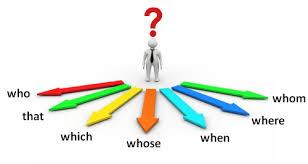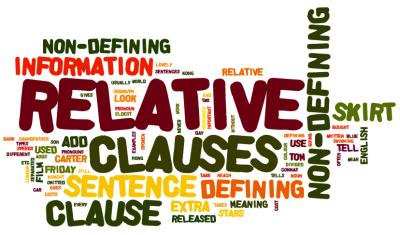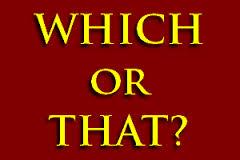Систематизация знаний по теме :
Relative pronouns and relative clauses
The relative pronouns are:
| Subject | Object | Possessive |
| who | who/whom | whose |
| which | which | whose |
| that | that | - |
We use relative pronouns to introduce relative clauses. Relative clauses tell us more about people and things:
Lord Thompson, who is 76, has just retired.
This is the house which Jack built.
Marie Curie is the woman that discovered radium.
We use:
Two kinds of relative clause
There are two kinds of relative clause:
1. We use relative clauses to make clear which person or thing we are talking about:
Marie Curie is the woman who discovered radium.
This is the house which Jack built.
In this kind of relative clause, we can use that instead of who or which:
Marie Curie is the woman that discovered radium.
This is the house that Jack built.
We can leave out the pronoun if it is the object of the relative clause:
This is the house that Jack built. (that is the object of built)
Relative pronouns 1
Relative pronouns 2
| Be careful! |
| The relative pronoun is the subject/object of the relative clause, so we do not repeat the subject/object: Marie Curie is the woman who she discovered radium.
(who is the subject of discovered, so we don't need she) This is the house that Jack built it.
(that is the object of built, so we don't need it) |
2. We also use relative clauses to give more information about a person, thing or situation:
Lord Thompson, who is 76, has just retired.
We had fish and chips, which I always enjoy.
I met Rebecca in town yesterday, which was a nice surprise.
With this kind of relative clause, we use commas (,) to separate it from the rest of the sentence.
| Be careful! |
| In this kind of relative clause, we cannot use that: Lord Thompson, who is 76, has just retired.
(NOT Lord Thompson, that is 76, has just retired.) and we cannot leave out the pronoun: We had fish and chips, which I always enjoy.
(NOT We had fish and chips, I always enjoy.) |
Relative pronouns 3
Relative pronouns 4
Level: intermediate
whose and whom
We use whose as the possessive form of who:
This is George, whose brother went to school with me.
We sometimes use whom as the object of a verb or preposition:
This is George, whom you met at our house last year.
(whom is the object of met)
This is George’s brother, with whom I went to school.
(whom is the object of with)
but nowadays we normally use who:
This is George, who you met at our house last year.
This is George’s brother, who I went to school with.
Relative pronouns 5
Relative pronouns with prepositions
When who(m) or which have a preposition, the preposition can come at the beginning of the clause:
I had an uncle in Germany, from who(m) I inherited a bit of money.
We bought a chainsaw, with which we cut up all the wood.
or at the end of the clause:
I had an uncle in Germany, who(m) I inherited a bit of money from.
We bought a chainsaw, which we cut all the wood up with.
But when that has a preposition, the preposition always comes at the end:
I didn't know the uncle that I inherited the money from.
We can't find the chainsaw that we cut all the wood up with.
Relative pronouns 6
when and where
We can use when with times and where with places to make it clear which time or place we are talking about:
England won the World Cup in 1966. It was the year when we got married.
I remember my twentieth birthday. It was the day when the tsunami happened.
Do you remember the place where we caught the train?
Stratford-upon-Avon is the town where Shakespeare was born.
We can leave out when:
England won the World Cup in 1966. It was the year we got married.
I remember my twentieth birthday. It was the day the tsunami happened.
We often use quantifiers and numbers with relative pronouns:
| all of which/whom | most of which/whom | many of which/whom |
| lots of which/whom | a few of which/whom | none of which/whom |
| one of which/whom | two of which/whom | etc. |
She has three brothers, two of whom are in the army.
I read three books last week, one of which I really enjoyed.
There were some good programmes on the radio, none of which I listened to.
EXERCISES
Relative Clauses + Exercises

Learn Relative Clauses with Examples and Exercises
What Is A Relative Clause?
A relative clause is a phrase that adds information to a sentence. All relative clauses describe a noun, and they begin with one of these relative pronouns or relative adverbs.
Relative Pronouns
who (to describe people – subject)
The woman who works in the bank is my neighbor.
whom (to describe people – object)
My cousins, one of whom is a doctor, live in England.
whose (to describe possession)
The man whose car was stolen went to the police station.
that (to describe things – defining relative clauses)
I’m selling the computer that I bought in the U.S.
which (to describe things – non-defining relative clauses)
I’m selling this computer, which has a 250-GB hard drive, for $500.
Relative Adverbs
when (to describe times)
My favorite season is fall, when all the leaves change color.
where (to describe places)
I visited the neighborhood where I grew up
why (to give a reason)
Do you know the reason why the stores are closed today?

Using relative clauses helps you create better sentences in English
Relative Clauses = Better Sentences In English
Here is an example of some English sentences without relative clauses:
Yesterday I met a man. He works in the circus.
I bought a cell phone. It has internet access.
There’s the restaurant. I ate at that restaurant last night.
These sentences are correct, but they are very short and simple. You can use relative clauses to make your sentences in English sound more fluent and natural:
Yesterday I met a man who works in the circus.
I bought a cell phone that has internet access.
There’s the restaurant where I ate last night.
Defining And Non-Defining Relative Clauses
Non-defining relative clauses add EXTRA information to the sentence.
Defining relative clauses add ESSENTIAL information to the sentence.
You can see if a relative clause is defining or non-defining by removing it from the sentence. If you remove a non-defining relative clause, the sentence still has the same meaning. If you remove a defining relative clause, the sentence has a different meaning or is incomplete.
Example of a sentence with a NON-DEFINING relative clause:
My brother, who lives in California, is an engineer.
If you remove “who lives in California,” the sentence still has the same meaning:
The relative clause “who lives in California” is extra information.
Example of a sentence with a DEFINING relative clause:
If you remove “who failed English class three times,” the sentence is incomplete:
Therefore, the relative clause “who failed English class three times” is essential information, because it defines which student, specifically, we are talking about.
In written English, use a comma before and after non-defining relative clauses.

Learn when to use “which” and “that” in relative clauses
Which Or That?
Use which for non-defining relative clauses, and use a comma before it.
Use that for defining relative clauses, and don’t use a comma before it.
The bananas that I bought on Monday are rotten.
The bananas, which I bought on Monday, are rotten.
In the first case, it’s possible that we have two types of bananas in the house:
Older bananas that I bought on Monday
Newer bananas that I bought on Wednesday
…and that only the first bananas are rotten, but the second bananas are not rotten.
In the second case, all the bananas in the house were bought on Monday, and they are all rotten.
Again, to decide if a clause is defining or non-defining, try removing it from the sentence:
I read all the books that I borrowed from the library.
Without clause: I read all the books.
(sentence is incomplete – WHAT books?)
The new Stephen King book, which I borrowed from the library, is very good.
Without clause: The new Stephen King book is very good.
(sentence is complete. The “library” part was only an extra detail)
Choose the correct relative adverb.
This is the station  Emily met James.
Emily met James.
July and August are the months  most people go on holiday.
most people go on holiday.
Do you know the reason  so many people in the world learn English?
so many people in the world learn English?
This is the church  Sue and Peter got married.
Sue and Peter got married.
Edinburgh is the town  Alexander Graham Bell was born.
Alexander Graham Bell was born.
25 December is the day  children in Great Britain get their Christmas presents.
children in Great Britain get their Christmas presents.
A famine was the reason  so many Irish people emigrated to the USA in the 19th century.
so many Irish people emigrated to the USA in the 19th century.
A greengrocer's is a shop  you can buy vegetables.
you can buy vegetables.
The day  I arrived was very nice.
I arrived was very nice.
A horror film was the reason  I couldn't sleep last night.
I couldn't sleep last night.
| Начало формы
| Q1. | Do you know anyone ..... could help me fix my computer? | |
| 
| where | |
| 
| which | |
| 
| who | |
| 
| whose | |
| 
| ![]()
| Q2. | A hammer is a tool ..... is used to knock nails into wood. | |
| 
| that | |
| 
| who | |
| 
| whom | |
| 
| whose | |
| 
| ![]()
| Q3. | The shop ..... we usually buy our bread has closed down. | |
| 
| that | |
| 
| where | |
| 
| who | |
| 
| whose | |
| 
| ![]()
| Q4. | The boy ..... dog was hit by a car has not been to school for 3 days, | |
| 
| that | |
| 
| which | |
| 
| who | |
| 
| whose | |
| 
| ![]()
| Q5. | My friend, ..... doesn't have a cell phone, suddenly knocked on the door last night. | |
| 
| that | |
| 
| which | |
| 
| who | |
| 
| whose | |
| 
| ![]()
| Q6. | Can you please return the calculator ..... you borrowed yesterday? | |
| 
| that | |
| 
| who | |
| 
| whom | |
| 
| whose | |
| 
| ![]()
| Q7. | The horse ..... was hit by the car was only slightly hurt. | |
| 
| what | |
| 
| which | |
| 
| who | |
| 
| whom | |
| 
| ![]()
| Q8. | An orphanage is a place ..... children who have no parents can live and be looked after. | |
| 
| that | |
| 
| who | |
| 
| which | |
| 
| where | |
| 
| ![]()
| Q9. | I didn't realize I had forgotten my passport until I reached the airport, ..... was very annoying. | |
| 
| that | |
| 
| what | |
| 
| which | |
| 
| where | |
| 
| ![]()
| Q10. | The students ..... test grades were low had to come back after school for an extra lesson. | |
| 
| that | |
| 
| who | |
| 
| which | |
| 
| whose | |
| 
| ![]()
| Q11. | The hotel, ..... is in the centre of the town, is to be knocked down and replaced by a bank. | |
| 
| that | |
| 
| what | |
| 
| which | |
| 
| where | |
| 
| ![]()
| Q12. | The person to ..... you sent the letter has moved to a new address? | |
| 
| who | |
| 
| whom | |
| 
| whose | |
| 
| which | Конец формы |
which - whose - who - when - where
Начало формы
Dallas is the city  Kennedy was shot.
Kennedy was shot.
Bill Clinton was the president  wife was called Hillary.
wife was called Hillary.
Sunday is the day  most countries respect a day of rest in the week.
most countries respect a day of rest in the week.
Rotterdam is the port  is the busiest in Europe.
is the busiest in Europe.
Yasser Arafat is the person  is the Palestinian leader.
is the Palestinian leader.
Robinson Crusoe is the fictional character  companion was Man Friday.
companion was Man Friday.
Smog is the thing  is a combination of fog and smoke, or pollution.
is a combination of fog and smoke, or pollution.
Rum is the strong drink  is associated with the Caribbean.
is associated with the Caribbean.
The Euro is the currency  is used in most of Europe.
is used in most of Europe.
Napoleon is the man  wife was called Josephine.
wife was called Josephine.
A metallurgist is a person  studies metals.
studies metals.
Hiroshima is the place  the first atomic bomb was dropped.
the first atomic bomb was dropped.
1914 is the year  the First World War started.
the First World War started.
Your mother-in-law is the person  son or daughter is married to you.
son or daughter is married to you.
A stapler is a thing  you use to attach papers together.
you use to attach papers together.
Конец формы









 Emily met James.
Emily met James.

















